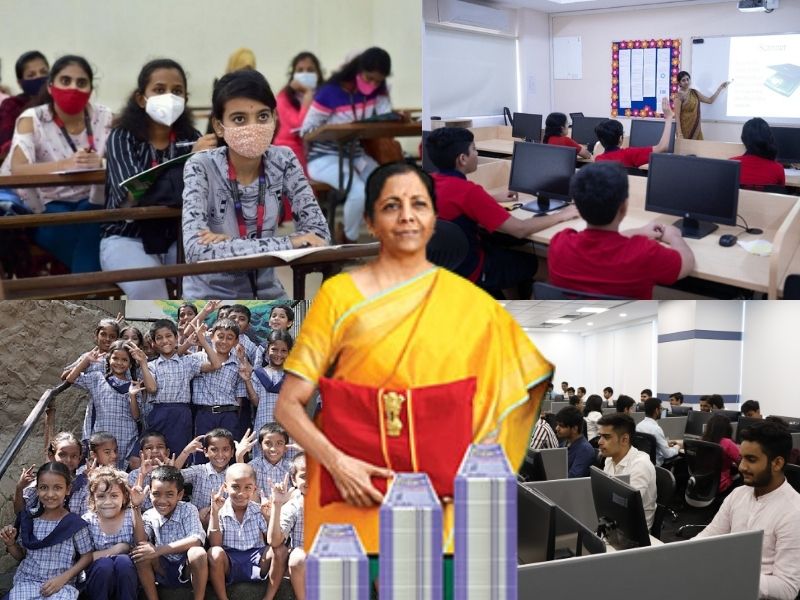Come February 2 and the union government will present the budget 2024-25. This budget will set the tone for the upcoming general elections which will take place later this year.
With the implementation of the National Education Policy 2020 and setting up of campuses by foreign institutes, anticipation of higher allocations are plentiful for the education sector.
Below are some pre-budget expectations from across those working in the field of education or allied areas.

Anish Srikrishna
“In the 2023-24 Union Budget, the Government allocated Rs 1.13-lakh crore, with an 8% YoY increase for higher education. As India witnesses dynamic changes and increased investments, there’s a growing demand for skilled professionals. Online Learning is now imperative for innovation and integration into the education landscape. To extend digital education to the masses, the Government should collaborate with EdTech entities for the National Digital University, offering programs, upskilling courses, and employment opportunities. This collaboration can be incentivized through tax benefits for EdTech companies, ensuring affordability. Additionally, increasing public-private partnerships, reducing GST on online courses, and addressing the digital divide are crucial steps for achieving 100% digital literacy in the country.” – Anish Srikrishna, CEO, TimesPro
“As India anticipates the upcoming Union Budget, a strong emphasis on education and skill development is crucial for achieving its ambitious goals. We look forward to increased allocation to higher education, reflecting India’s commitment to nurturing a knowledgeable and skilled generation for global competitiveness. Given India’s prominence in STEM, any policies boosting students’ aspirations in this field would be appreciated. The government’s vision to contribute 25% of the global workforce by 2047 is commendable, aligning with the impactful role of the Indian diaspora. This budget has the potential to be transformative, shaping a brighter and more skilled future on both national and international educational fronts.” – Manu Smadja, CEO & Co-Founder, MPOWER Financing
 “The Indian Edtech market has seen steady growth in recent years due to technological advancements, increased demand for skills in a competitive job market and improved accessibility of education. The sector is projected to continue growing in 2024. Various reforms and policies have been implemented every year, favouring the education system. However, we expect more robust system to be developed, investing in professional development and training opportunities to help us effectively implement blended learning methods in the classroom and utilize technology-enabled infrastructure. We also expect a decrease in Goods and Services Tax on resources for offline and online education providers. The education system also needs to be modernized to attract more international students. This will require substantial investments in the education system, particularly emphasizing higher education. As per the data, higher education investment will also help improve the gross enrolment ratio (GER), which is set to reach 50% by 2035. I also feel that since many graduates are struggling with placements, earmarking funds for new initiatives that help re-invent the education sector in the 21st century through the integration of learning and working will yield a significant return on investment for learners, employers and society as a whole. These initiatives are expected to enhance the quality of education in India and contribute to developing a better-educated workforce.” –Dinesh Kumar Poobalan, CEO & CTO, Greatify
“The Indian Edtech market has seen steady growth in recent years due to technological advancements, increased demand for skills in a competitive job market and improved accessibility of education. The sector is projected to continue growing in 2024. Various reforms and policies have been implemented every year, favouring the education system. However, we expect more robust system to be developed, investing in professional development and training opportunities to help us effectively implement blended learning methods in the classroom and utilize technology-enabled infrastructure. We also expect a decrease in Goods and Services Tax on resources for offline and online education providers. The education system also needs to be modernized to attract more international students. This will require substantial investments in the education system, particularly emphasizing higher education. As per the data, higher education investment will also help improve the gross enrolment ratio (GER), which is set to reach 50% by 2035. I also feel that since many graduates are struggling with placements, earmarking funds for new initiatives that help re-invent the education sector in the 21st century through the integration of learning and working will yield a significant return on investment for learners, employers and society as a whole. These initiatives are expected to enhance the quality of education in India and contribute to developing a better-educated workforce.” –Dinesh Kumar Poobalan, CEO & CTO, Greatify
Sudhir Kothari
“Experienced and successful founder & CEO with a demonstrated history of working in the information technology and services industry for 35 years. Built a successful company, Embee Software Pvt Ltd around the philosophy of Intrapreneurship so that the organization forever remains agile to change, and client-oriented. A highly decisive, action-oriented, and hands-off person who believes in “always on” business transformation to achieve continuous success. Skilled in Business Alliances, relationship management, building medium to long-term vision & strategy and successfully executing them.” – Sudhir Kothari, Managing Director & CEO, Embee Software
“In anticipation of the upcoming budget, we call for a transformative fiscal roadmap with education at its core. We urge for increased scholarships and financial aid, prioritizing affordability for underprivileged students. Emphasizing an inclusive approach, the budget should allocate resources for educational infrastructure, inclusive policies, innovation, and reducing economic barriers to learning. While the previous budget allocated INR 1.12 lakh crore to education, concerns linger over the apparent stagnation at 2.9% of GDP in 2023-24, contrasting with the NEP’s recommendation of 6% of GDP. We hope for undivided focus and increased funding momentum in the education sector to empower youth and fulfill the aspirations outlined in the NEP.” – Ashutosh Burnwal, Founder and CEO, Buddy4Study
“Addressing the shortage of qualified teachers is a priority, requiring investments in teacher training programs and incentives for educator retention. The proposed ‘National Research Foundation (NRF)’ under the NEP offers opportunities for meaningful industry-academia collaboration. The budget could incentivize this, fostering data sharing and technical support for researchers to drive innovation and bridge the gap between academic research and industry needs.” – Vishnu Manchu, Pro-Chancellor, Mohan Babu University
“In 2022, the Standing Committee on Education, Women, Children, Youth and Sports observed that student financial aid schemes were not sufficient to cover the cost of higher education. This is because most expenditure from the scholarship is towards course fees. (Report No. 337, Standing Committee on Education, Women, Children, Youth and Sports, on “Demands for Grants 2022-23 of the Department of Higher Education”, Rajya Sabha, March 16, 2022). Government should earmark specific funds for self-funded autonomous institutions approved by AICTE and offer the PGDM degree as these institutions must depend totally on student fees.” – Dr. Madhumita Chatterji, Director, ABBS School of Management
“With the Union Budget 2024 around the corner, we expect a strong focus on supporting the edtech sector. We are hopeful that the government will bring down the 18% Goods and Service Tax (GST) on online learning resources, a crucial step that will make educational services more affordable and accessible. With the rise of hybrid/online education, there’s a need to increase investment in technology infrastructure at schools and colleges. We are also hopeful to see some government backed accelerator programs, and innovation hubs that will encourage R&D and innovation in the sector. Under the Skill India Mission, the government has been focusing on upskilling programs. We foresee increased cooperation of private players in skilling India, to make youth employable.” – Anil Nagar, Founder & CEO, Adda247 (a vernacular learning platform)
 “In view of the upcoming interim Union Budget, we would like to appeal to the government to increase the education sector’s budget and reduce the GST slab from 18% to 5% on educational products & services. Our aim is to establish a strong foundation for the country’s children, particularly those from economically disadvantaged backgrounds. Additionally, given the evolving world and our shifting approach to education, driving a change to ensure affordable and quality education at scale needs more collaboration for public and private sectors. – Prateek Maheshwari, Co-Chair of India Edtech Consortium (IEC) and Co-Founder of PhysicsWallah
“In view of the upcoming interim Union Budget, we would like to appeal to the government to increase the education sector’s budget and reduce the GST slab from 18% to 5% on educational products & services. Our aim is to establish a strong foundation for the country’s children, particularly those from economically disadvantaged backgrounds. Additionally, given the evolving world and our shifting approach to education, driving a change to ensure affordable and quality education at scale needs more collaboration for public and private sectors. – Prateek Maheshwari, Co-Chair of India Edtech Consortium (IEC) and Co-Founder of PhysicsWallah
“Our overarching hope is for a budget that seamlessly integrates education, employment, and health, leveraging digital technologies to enhance efficiency, transparency, and inclusivity across these crucial sectors. This approach aims to propel India towards a resilient and digitally empowered future.” – Manikanth Challa, CEO and founder, Workruit
 “If India wishes to fulfil the dream of providing 25% per cent of the global workforce by 2047, access to world-class education is essential. The NEP 2020 also emphasises a multidisciplinary and holistic approach. With the emergence of new-age technologies, there is a significant shift in the preference of students from traditional to creative industries such as design, fashion, literature, gaming etc. Creating a conducive environment for the growth of this sector will require an amalgamation of various learning dimensions like research, innovation, skill development and entrepreneurship.” – Dr Dhara Thakore, Head Incubation and Office of Career Service, Anant National University
“If India wishes to fulfil the dream of providing 25% per cent of the global workforce by 2047, access to world-class education is essential. The NEP 2020 also emphasises a multidisciplinary and holistic approach. With the emergence of new-age technologies, there is a significant shift in the preference of students from traditional to creative industries such as design, fashion, literature, gaming etc. Creating a conducive environment for the growth of this sector will require an amalgamation of various learning dimensions like research, innovation, skill development and entrepreneurship.” – Dr Dhara Thakore, Head Incubation and Office of Career Service, Anant National University
The government’s efforts in implementing skill development programs have set the stage for positive change. However, there is a need to strengthen industry-academia collaboration for better alignment of academic curricula with the evolving job market. Moreover, prioritizing financial support for Academic-Industry Collaboration is crucial, as it serves to forge robust connections between educational institutions and industries. – Dr. Prof Anand Achari, Principal, Vivekanand Education Society’s College of Architecture
Also read: Union Budget 2023-24: 260 million children shortchanged. again.
Posted in National, News























